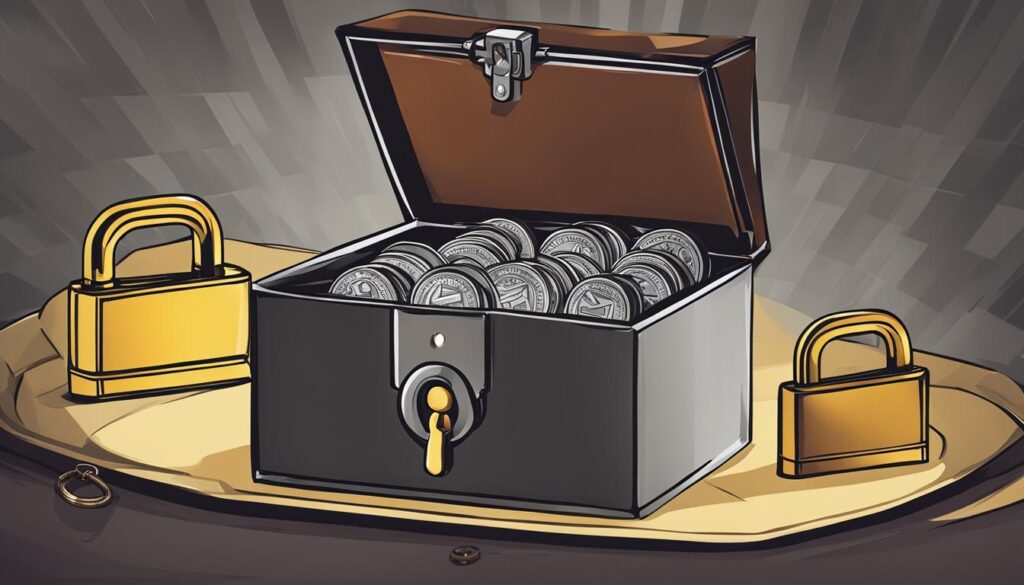Are you confused about the difference between a cryptocurrency exchange and a cryptocurrency wallet? Many people use the terms interchangeably, but they are actually two distinct components in the world of cryptocurrencies. So, what sets cryptocurrency wallets apart from exchanges? And what are the key distinctions between the two? Let’s delve into the details and uncover the contrasting features that differentiate cryptocurrency wallets and exchanges.
Key Takeaways:
- A crypto exchange is an online marketplace where users can buy, sell, and trade cryptocurrencies.
- A crypto wallet is a software or hardware tool used to securely store, send, and receive cryptocurrencies.
- The primary difference lies in functionality, with exchanges focusing on facilitating transactions and wallets prioritizing secure storage.
- Wallets generally offer a higher level of security as users have control over their private keys.
- Both wallets and exchanges play crucial roles in managing cryptocurrencies and should be chosen based on individual needs and goals.
Understanding Crypto Wallets
A crypto wallet is a digital tool that allows users to manage their cryptocurrencies on the blockchain. It serves as a secure storage solution for storing, sending, and receiving various cryptocurrencies. There are several types of crypto wallets available, each offering different features and levels of security.
Types of Crypto Wallets
1. Desktop Wallets:
Desktop wallets are lightweight applications that can be installed on computers. They provide users with direct control over their cryptocurrencies and are accessible even when offline. Desktop wallets are suitable for those who prioritize security and want to have full control over their crypto assets.
2. Mobile Wallets:
Mobile wallets are smartphone applications that enable users to manage their cryptocurrencies on the go. They provide convenience and accessibility, allowing users to make transactions easily using their mobile devices. Mobile wallets are ideal for individuals who frequently engage in cryptocurrency transactions and require a portable solution.
3. Web Wallets:
Web wallets are provided by cryptocurrency exchanges and can be accessed through a web browser. They are convenient for users who want to store their cryptocurrencies online and have easy access to their funds. However, it’s important to note that web wallets are custodial, meaning that users do not have direct control over their private keys.
4. Paper Wallets:
Paper wallets involve printing out the private and public keys on a physical piece of paper. These wallets are considered one of the most secure options as they are completely offline and not susceptible to online attacks. Paper wallets are suitable for long-term storage or individuals who prioritize offline security.
5. Hardware Wallets:
Hardware wallets are physical devices that store cryptocurrency private keys offline. They offer the highest level of security as they are immune to malware attacks. Hardware wallets are generally preferred for large cryptocurrency holdings or individuals who want maximum protection for their assets.
Key Features and Security
When choosing a crypto wallet, it is important to consider features such as ease of use, security measures, and compatibility with different cryptocurrencies. Storage and encryption of private keys, backup and recovery options, and two-factor authentication are key security features to look for in a crypto wallet.
It’s worth noting that while hardware wallets provide the highest level of security, they can be more complex to use compared to other wallet types. On the other hand, web wallets and mobile wallets offer convenience but may have lower security levels due to their online nature.
Exploring Crypto Exchanges
A crypto exchange is an online platform where users can buy, sell, and trade cryptocurrencies. In the world of digital assets, exchanges play a crucial role in facilitating transactions and providing liquidity. There are two main types of exchanges: centralized exchanges and decentralized exchanges. Let’s explore the characteristics of each type:
Centralized Exchanges
Centralized exchanges are operated by a single entity and act as intermediaries between buyers and sellers. These exchanges provide a wide range of cryptocurrencies for trading, enabling users to easily buy and sell their digital assets. Centralized exchanges are known for their user-friendly interfaces and robust trading features that cater to both novice and experienced traders. Some popular centralized exchanges include Coinbase, Binance, and Kraken.
Decentralized Exchanges
Decentralized exchanges, also known as DEXs, operate on blockchain technology and do not rely on a central authority. These exchanges facilitate peer-to-peer transactions, allowing users to trade directly with one another without the need for intermediaries. Decentralized exchanges prioritize privacy and security, as users retain control over their funds and conduct transactions in a trustless environment. Some popular decentralized exchanges include Uniswap, Sushiswap, and Paxful.
| Centralized Exchanges | Decentralized Exchanges |
|---|---|
| Coinbase | Uniswap |
| Binance | Sushiswap |
| Kraken | Paxful |
Table: Popular Exchanges
Both centralized and decentralized exchanges have their merits. Centralized exchanges offer convenience and a wide variety of trading options, making them ideal for beginners and active traders. On the other hand, decentralized exchanges provide users with increased control, privacy, and security, appealing to those who value self-custody and anonymity.
As the crypto market continues to evolve, the choice between centralized and decentralized exchanges becomes a matter of individual preference. It is important to weigh factors such as ease of use, security, fees, and available trading pairs when selecting a cryptocurrency exchange that aligns with your goals and trading style.

Functionality and Security Comparison
The functionality and security of crypto exchanges and wallets are two crucial aspects to consider when managing your digital assets. Let’s explore the distinctions between these two components and understand how they impact your control over funds in exchanges and wallets.
Functionality of Crypto Exchanges and Wallets
A crypto exchange is primarily designed to facilitate transactions and provide trading services. It serves as an online marketplace where users can buy, sell, and trade cryptocurrencies. Exchanges offer a wide range of trading pairs, order types, and liquidity options, catering to the needs of both novice and experienced traders.
In contrast, a crypto wallet focuses on secure storage and management of cryptocurrencies. It allows users to securely store their digital assets, send and receive funds, and manage their private keys. Wallets come in different forms, such as software wallets (desktop, mobile, or web-based), paper wallets, or hardware wallets.
|
Functionality |
Crypto Exchanges |
Crypto Wallets |
|---|---|---|
|
Primary Purpose |
Facilitate transactions and trading |
Securely store and manage cryptocurrencies |
|
Main Features |
Trading pairs, order types, liquidity options |
Secure storage, fund management, private key control |
Security of Crypto Exchanges and Wallets
When it comes to security, wallets generally offer a higher level of protection compared to exchanges. This is primarily because wallets provide users with control over their private keys, which are essential for accessing and managing their funds. With a self-custody wallet, you have sole ownership and control over your private keys, minimizing the risk of unauthorized access.
Exchanges, especially centralized ones, can be vulnerable to security breaches, hacks, or theft. When you store your funds on an exchange, you are entrusting the platform with the security of your assets. While reputable exchanges implement security measures such as encryption and cold storage, the risk of a potential breach still exists.
Table: Security Comparison
|
Crypto Exchanges |
Crypto Wallets |
|
|---|---|---|
|
Control over Private Keys |
Depends on the exchange |
User has control |
|
Risk of Hacks and Theft |
Potential vulnerability |
Lower risk with proper security measures |
By utilizing a self-custody wallet, you retain control over your private keys, enhancing the security of your funds.
In summary, while crypto exchanges focus on functionality and trading services, crypto wallets prioritize the security and control over your digital assets. Wallets offer a higher level of protection by granting users control over their private keys, whereas exchanges can be susceptible to security breaches. Ultimately, the choice between an exchange and a wallet depends on your preferences and the level of control and security you desire.
Choosing the Right Solution
The choice between a crypto exchange and a wallet depends on individual needs and preferences. When deciding between a wallet and an exchange, it’s crucial to consider several factors:
- Comfort with technology: Evaluate your familiarity with digital platforms and your willingness to learn new tools. Crypto exchanges can be more user-friendly for beginners, while wallets may require a certain level of technical understanding.
- Level of crypto usage: Determine the frequency and purpose of your crypto transactions. If you’re actively trading or frequently converting between different cryptocurrencies, a centralized exchange with its trading features might be more suitable. Alternatively, if you primarily hold cryptocurrencies for long-term investment purposes, a self-custody wallet offers greater control and security.
- Security concerns: Assess your risk tolerance and prioritize the security of your digital assets. Wallets, especially self-custody wallets, provide more control over private keys and reduce the vulnerability to hacks or thefts associated with centralized exchanges. If security is a primary concern, opting for a wallet might be the better choice.
For newcomers to the crypto space, starting with a trusted centralized exchange wallet can be a convenient way to familiarize yourself with the basics of cryptocurrency management. As you gain more experience and confidence, you can consider transitioning to self-custody wallets or exploring decentralized exchanges. Ultimately, the decision between a wallet and an exchange should align with your personal crypto strategies and goals.
Security Risks and Precautions
When it comes to managing your cryptocurrency, it’s essential to be aware of the security risks involved. Whether you choose to store your digital assets in a centralized exchange or a self-custody wallet, there are precautions you should take to protect your funds.
- Risks of Crypto Storage: Storing your cryptoassets always carries some level of risk. It’s crucial to understand the potential threats and vulnerabilities, such as hacking, malware, or phishing attacks, that could compromise your funds.
- Risks of Centralized Exchanges: Centralized exchanges are attractive targets for hackers due to the large amounts of cryptocurrency they hold. If a centralized exchange is hacked or shuts down, there is a risk of losing your funds.
- Risks of Self-Custody Wallets: While self-custody wallets provide users with full control over their private keys, they also come with risks. If you lose your private keys or fall victim to a scam, you may lose access to your funds permanently.
To mitigate these risks, here are some precautions you can take for secure crypto storage:
- Use Hardware Wallets: Hardware wallets offer an extra layer of security by storing your private keys offline. They are resistant to hacking attempts and provide a safe way to store your cryptoassets.
- Secure Your Recovery Phrases: If you’re using a self-custody wallet, make sure to write down your recovery phrases and store them in a secure location. These phrases are essential in recovering your wallet if you lose access to it.
- Stay Informed: Keep yourself updated on the latest crypto safety practices and news. This will help you stay ahead of emerging threats and make informed decisions about the security of your cryptocurrency.
“By taking the necessary precautions and staying vigilant, you can minimize the risks associated with crypto storage and ensure the safety of your funds.”
Remember, the security of your cryptocurrency ultimately depends on your actions and how well you protect your private keys. By implementing these precautions and staying informed, you can enhance the security of your crypto storage and have peace of mind knowing that your funds are well-protected.

Transitioning from Exchange to Wallet
Moving crypto assets from a centralized exchange to a self-custody wallet is a straightforward process that allows users to gain full control over their digital assets. Here are the steps to transfer funds from an exchange to a wallet:
- Create a self-custody wallet: Choose a reputable wallet provider and follow their instructions to create a self-custody wallet.
- Generate a wallet address: Once the wallet is set up, generate a unique wallet address for receiving funds.
- Backup wallet recovery phrases: It is crucial to back up wallet recovery phrases provided by the wallet provider. These phrases are essential for recovering access to the wallet in case of loss or device failure.
- Verify wallet address: Before initiating any transfers, double-check the accuracy of the wallet address to ensure the funds are sent to the correct destination.
- Initiate the transfer: Access your exchange account and locate the option to withdraw or send funds. Enter the wallet address generated earlier, specify the amount to transfer, and submit the transaction.
By following these steps and paying attention to the details, users can securely transition their funds from an exchange to a self-custody wallet, gaining enhanced control and security over their crypto assets.
Example Table: Pros and Cons of Exchanges and Wallets
| Exchanges | Wallets | |
|---|---|---|
| Functionality | Facilitate buying, selling, and trading of cryptocurrencies | Focus on secure storage and management of digital assets |
| Security | Vulnerable to hacks and theft | Users have control over their private keys, reducing the risk of unauthorized access |
| Control | Users rely on the exchange’s custody of their funds | Users have full control over their digital assets |
| Convenience | Provides a user-friendly interface for trading | Requires users to manage their private keys, which can be more complex |
This table presents a comparison of the pros and cons of exchanges and wallets, highlighting their distinct characteristics and features. While exchanges offer convenience and trading capabilities, wallets provide enhanced security and control.
Considering Safety Factors
When it comes to managing cryptocurrencies, ensuring the safety of your funds is of utmost importance. Whether you choose to use a centralized exchange or a self-custody wallet, there are specific safety considerations to keep in mind. Let’s explore the safety aspects of both options and discuss transferring assets to a self-custody solution.
Safety of Funds in Exchanges
Centralized exchanges are susceptible to various risks, including hacking and legal issues. These risks can potentially impact users’ funds and result in financial losses. To mitigate these risks, it is crucial to choose reputable and well-established exchanges that prioritize the security of user assets. Additionally, enabling two-factor authentication (2FA) and regularly updating passwords can provide an extra layer of protection for your account.
Safety of Self-Custody Wallets
Self-custody wallets, on the other hand, offer users more control over their funds and are generally considered to be more secure. However, they require users to take the responsibility of safeguarding their private keys. It is crucial to follow best practices, such as storing recovery phrases in secure locations and avoiding sharing them with anyone. By being cautious and staying informed about potential scams and phishing attempts, users can maximize the safety of their self-custody wallets.
Transferring Assets to a Self-Custody Solution
Many individuals choose to transfer their assets from a centralized exchange to a self-custody wallet to enhance security and have full control over their funds. When transferring assets, it is essential to consider the trade-off between trusting an intermediary versus taking personal responsibility for securing your funds. By moving your assets to a self-custody solution, you can eliminate the risk of funds being compromised through exchange vulnerabilities while enjoying the benefits of enhanced security.
Remember, the safety of your funds ultimately lies in your hands. Whether you choose a centralized exchange or a self-custody wallet, it is important to understand the risks involved and take appropriate measures to protect your digital assets.

Table: Comparing the Safety Aspects of Exchanges and Self-Custody Wallets
| Centralized Exchanges | Self-Custody Wallets | |
|---|---|---|
| Security | Subject to hacking and legal risks | Offers more control over funds |
| Trust | Involves trusting an intermediary | Requires personal responsibility and trust in self |
| Convenience | Provides a user-friendly interface | Requires technical understanding and management |
| Ownership | May require giving up direct ownership of funds | Offers complete ownership and control |
By considering the safety factors associated with both centralized exchanges and self-custody wallets, you can make an informed decision based on your risk tolerance and preferences. Whichever option you choose, always prioritize the security and protection of your crypto assets.
Best Practices for Crypto Management
Managing cryptocurrencies effectively requires following best practices to ensure security and optimize functionality. Here are some key recommendations for managing your crypto assets:
1. Storing Long-Term Holdings
For long-term storage of cryptocurrencies, it is highly recommended to use secure wallets, particularly hardware wallets. Hardware wallets offer offline storage and heightened security measures, protecting your assets from potential cyber threats and unauthorized access. By choosing reliable hardware wallets, such as Ledger or Trezor, you can have peace of mind knowing that your long-term holdings are well-protected.
2. Utilizing Exchanges for Trading and Conversions
Cryptocurrency exchanges provide a convenient platform for trading and converting digital assets. When engaging in frequent transactions or conversions, it is advisable to utilize exchanges, as they offer user-friendly interfaces, ample liquidity, and competitive pricing. Some popular exchanges include Coinbase, Binance, and Kraken.
3. Combining Wallets for Seamless Transactions
To enhance the convenience of your crypto transactions, consider combining different types of wallets. For daily transactions, mobile wallets provide a user-friendly experience, allowing you to easily send and receive cryptocurrencies on the go. By utilizing self-custody mobile wallets like Trust Wallet or Metamask, you maintain control over your funds while enjoying a seamless transaction experience.
4. Exploring Decentralized Exchanges for Peer-to-Peer Transactions
In addition to centralized exchanges, decentralized exchanges (DEXs) offer a peer-to-peer trading experience without the need for intermediaries. DEXs leverage blockchain technology to facilitate secure transactions directly between users. Make use of popular DEXs like Uniswap, Sushiswap, or PancakeSwap to take advantage of the decentralized nature of cryptocurrencies.
5. Advanced Wallet Options for Enhanced Security
For advanced users seeking additional layers of security, exploring options like multisig wallets can provide enhanced protection for your crypto holdings. Multisig wallets require multiple cryptographic signatures to authorize transactions, reducing the risk of unauthorized access. This extra layer of security makes it more challenging for malicious actors to compromise your funds.
By following these best practices, you can effectively manage your cryptocurrencies, striking a balance between security, convenience, and functionality. Remember to stay informed about the latest industry developments and security measures to adapt to the constantly evolving crypto landscape.

Balancing Convenience and Security
When it comes to managing crypto investments, finding the right balance between convenience and security is crucial. While centralized exchanges offer convenience in buying, selling, and trading cryptocurrencies, they also come with potential security risks. On the other hand, self-custody wallets provide enhanced security, but they require users to take responsibility for safeguarding their funds.
The key to managing crypto investments effectively lies in understanding individual needs and risk tolerance. By carefully considering these factors, users can find the optimal solution that strikes a balance between convenience and security in their crypto management strategies.
Convenience vs Security
Convenience and security are two essential aspects to consider when managing crypto investments. Centralized exchanges offer user-friendly interfaces, liquidity, and a wide range of available cryptocurrencies, making them convenient for quick transactions. However, they also pose potential security risks as users must rely on the exchange’s security measures to protect their funds.
Self-custody wallets, on the other hand, prioritize security by providing users with control over their private keys. This added security comes at the cost of convenience, as users must manage their wallets, protect their private keys, and ensure backup and recovery of their funds.
Finding the Right Balance
Finding the right balance between convenience and security requires considering individual needs and risk tolerance. Here are some factors to consider:
- Frequency of transactions: Users who frequently trade or need quick access to their funds may prioritize convenience and choose a centralized exchange. However, they should be aware of potential security risks and take necessary precautions to protect their assets.
- Holding long-term investments: For users who plan to hold cryptocurrencies as long-term investments, self-custody wallets provide enhanced security. While they may require more effort to manage, they offer greater control and protection over funds.
- Security measures: Users with a higher risk tolerance and technical expertise may opt for self-custody wallets and explore additional security measures like hardware wallets or multisig wallets for added protection.
Managing Crypto Investments
Managing crypto investments effectively involves striking a balance between convenience and security. This can be achieved by utilizing a combination of centralized exchanges and self-custody wallets based on individual needs and risk assessment.
For example, users can choose to keep a portion of their funds in a trusted centralized exchange for quick access and trading, while securely storing the majority of their assets in self-custody wallets for long-term holding. This approach allows users to enjoy the convenience of centralized exchanges while maximizing the security of their crypto investments.
To further illustrate the balance between convenience and security in managing crypto investments, here is a visual representation:
| Convenience | Security |
|---|---|
| Centralized Exchanges | Self-Custody Wallets |
In conclusion, finding the right balance between convenience and security is essential when managing crypto investments. By carefully considering individual needs, risk tolerance, and utilizing a combination of centralized exchanges and self-custody wallets, users can effectively balance the convenience of quick transactions with the enhanced security of managing their own funds.
The Role of Exchanges and Wallets in Crypto
Both exchanges and wallets play crucial roles in the world of cryptocurrencies. Exchanges serve as marketplaces where users can buy, sell, and trade digital assets. They provide a convenient platform for users to engage in cryptocurrency transactions. Wallets, on the other hand, are essential for securely storing and managing digital assets.
Exchanges offer a wide range of cryptocurrencies for users to choose from, making it easier to access a diverse portfolio. They also provide liquidity and facilitate price discovery by matching buyers and sellers. Exchanges play a significant role in determining the value and market dynamics of various cryptocurrencies.
Wallets, whether software or hardware-based, serve as secure storage solutions for digital assets. They allow users to safely store their cryptocurrencies and access them when needed. Wallets come with unique features such as encryption and private key management, ensuring the security and integrity of users’ digital assets.
By understanding the distinct functions and features of exchanges and wallets, users can effectively manage their crypto assets. It’s important to choose a reputable exchange that prioritizes security and offers reliable customer support. Similarly, selecting a wallet with robust security measures and user-friendly features is crucial for safeguarding digital assets.
Managing digital assets involves a combination of exchanges and wallets. Exchanges provide the avenue for buying or selling cryptocurrencies, while wallets offer a secure storage solution for long-term asset management. Users can transfer their assets from an exchange to a wallet to maintain full control and security.
Advantages of Exchanges:
- Wide range of cryptocurrencies available
- Marketplace for buying, selling, and trading
- Facilitates liquidity and price discovery
- Convenient for cryptocurrency transactions
Advantages of Wallets:
- Secure storage for digital assets
- Encryption and private key management
- Access to digital assets when needed
- Ability to manage multiple cryptocurrencies
By utilizing exchanges and wallets effectively, users can navigate the crypto landscape and make informed decisions regarding their digital assets.
| Exchanges | Wallets |
|---|---|
| Serve as marketplaces | Securely store digital assets |
| Facilitate buying, selling, and trading | Enable access to cryptocurrencies |
| Offer diverse range of cryptocurrencies | Provide encryption and private key management |
| Match buyers and sellers | Allow users to manage multiple assets |
Remember, it’s essential to choose reputable exchanges and wallets, follow best security practices, and stay informed about the evolving crypto landscape to effectively manage your digital assets.
Safeguarding Your Crypto Assets
When it comes to protecting your crypto assets, following best practices for securing digital assets is paramount. By implementing proper security measures, you can ensure the safety of your investments and protect against unauthorized access. Here are some key practices to safeguard your crypto assets:
- Store Private Keys Securely: Keep your private keys in secure locations, such as offline and encrypted hardware wallets or encrypted digital vaults. Avoid storing them online or in easily accessible places.
- Enable Two-Factor Authentication (2FA): 2FA adds an extra layer of security by requiring an additional verification step, such as a code sent to your phone, when accessing your crypto accounts.
- Stay Vigilant Against Phishing Attempts: Be cautious of suspicious emails, messages, or websites that attempt to trick you into revealing your private keys or other sensitive information. Always verify the authenticity of the source before providing any personal details.
- Avoid Sharing Private Keys and Recovery Phrases: Never share your private keys or recovery phrases with anyone, as this can make your crypto assets vulnerable to theft. Keep this information confidential and secure.
“The security of your crypto assets relies on the precautionary measures you take.” – Crypto Security Expert
By following these best practices, you can minimize the risk of unauthorized access and potential loss of your crypto assets. It’s essential to stay proactive and educated about the evolving security landscape in the crypto industry.
Securing Your Crypto Assets: A Comparison
Let’s compare the security features of centralized exchanges and self-custody wallets to help you make an informed decision:
| Security Factors | Centralized Exchanges | Self-Custody Wallets |
|---|---|---|
| Control Over Private Keys | Limited control as the exchange manages the keys | Full control as you manage and secure the keys |
| Personal Responsibility | Relies on the exchange’s security measures | Requires personal responsibility for securing keys and taking precautions |
| Risks of Hacks or Theft | Exchanges can be susceptible to hacks or thefts | Greater control over security minimizes the risk of hacks or thefts |
By using self-custody wallets, you gain full control over your private keys and reduce the risk of unauthorized access to your crypto assets. However, it’s important to balance the convenience of centralized exchanges with the added security of self-custody wallets based on your individual needs and risk tolerance.
Remember, protecting your crypto assets is an ongoing commitment. Stay updated on the latest security practices, remain vigilant against potential threats, and adapt your security measures as needed. By implementing these best practices and safeguarding your private keys, you can ensure the security and integrity of your crypto assets.
Understanding Wallet and Exchange Risks
Both crypto exchanges and wallets come with their fair share of risks. It’s important to be aware of these risks to protect your digital assets. Exchanges, for instance, can be vulnerable to hacks, thefts, or legal issues, which can lead to the loss or manipulation of users’ funds. On the other hand, wallets, especially self-custody ones, require users to take precautions and safeguard against potential risks such as losing private keys or falling victim to scams.
To mitigate these risks and ensure the security of your crypto management, it’s crucial to implement appropriate security measures. This includes:
- Using strong and unique passwords for exchange accounts and wallets
- Enabling two-factor authentication (2FA) for added security
- Regularly updating software and firmware for wallets and devices
- Keeping software and antivirus programs up to date to protect against malware or phishing attempts
- Using hardware wallets for enhanced security and offline storage of private keys
- Encrypting and securely storing recovery phrases and wallet backups
- Staying informed about current security practices and potential threats in the crypto industry
By understanding the specific risks associated with exchanges and wallets and implementing these security measures, you can minimize the potential risks and protect your crypto assets from unauthorized access or loss.
“The security of your crypto assets should be a top priority. By taking the necessary precautions and understanding the risks associated with exchanges and wallets, you can mitigate potential threats and safeguard your digital wealth.” – Crypto Security Expert
Comparison of Exchange and Wallet Risks
Let’s take a closer look at the risks associated with crypto exchanges and wallets:
| Exchange Risks | Wallet Risks |
|---|---|
| • Hacking and theft of funds • Vulnerabilities in security measures • Legal and regulatory risks • Manipulation of trading activities |
• Loss of private keys • Scams and phishing attempts • Malware or keylogger attacks • Lack of backup or recovery options |
Understanding these risks can help you make more informed decisions when it comes to managing your crypto assets. It’s essential to evaluate the security features and measures offered by exchanges and wallets before trusting them with your funds. Additionally, regular security audits and staying updated on the latest security practices can further enhance your protection against potential risks.
Remember that while there are risks involved, there are also ways to mitigate them. By taking the necessary precautions and staying informed, you can safely navigate the world of crypto and protect your digital assets.
Navigating the Crypto Landscape
The world of cryptocurrencies is constantly evolving, making it crucial for crypto enthusiasts to stay informed and adapt to the changing landscape of digital assets. To effectively manage cryptocurrencies, it is essential to understand the differences between exchanges and wallets and to stay updated on best practices, industry developments, and security measures.
As the market for cryptocurrencies continues to expand, managing digital assets requires knowledge and awareness. By keeping up with the latest trends and advancements, users can make informed decisions and navigate the crypto landscape more effectively.
Staying Informed: Key to Managing Cryptocurrencies
Staying informed in the crypto landscape is vital for making wise investment choices and protecting digital assets. With new cryptocurrencies, technologies, and market developments emerging regularly, it is essential to stay updated on the latest news and trends.
Engaging with reputable sources such as industry news websites, cryptocurrency blogs, and forums can provide valuable insights into market trends, industry regulations, and upcoming projects. Following influential figures and thought leaders in the crypto community on social media platforms can also offer real-time updates and expert opinions.
Moreover, joining online communities or participating in crypto-focused events and conferences can provide opportunities to learn from industry experts and connect with like-minded individuals.
The Evolving Nature of Digital Assets
“The only constant in the crypto world is change.” – Cryptocurrency Investor”
Cryptocurrencies are highly dynamic, with new projects and technologies emerging regularly. Understanding the evolving nature of digital assets is essential for effectively managing cryptocurrencies.
From the early days of Bitcoin to the emergence of altcoins, stablecoins, and decentralized finance (DeFi) protocols, the crypto landscape is constantly evolving to meet the changing needs and demands of users.
Being aware of these advancements and the potential risks and opportunities they bring can help investors navigate the crypto landscape more confidently. By staying informed, investors can make more informed decisions and adapt their strategies to maximize their crypto holdings.
Managing Cryptocurrencies: Exchanges and Wallets
When it comes to managing cryptocurrencies, two key components are exchanges and wallets. Exchanges serve as platforms for buying, selling, and trading digital assets, while wallets provide secure storage for cryptocurrencies.
It is important to understand the differences between exchanges and wallets and the roles they play in managing digital assets. Crypto exchanges offer convenience and liquidity, enabling users to access various cryptocurrencies and engage in trading activities.
On the other hand, crypto wallets focus on security and allow users to store, send, and receive cryptocurrencies securely. By leveraging efficient wallet solutions, individuals can maintain control over their digital assets and reduce the risk of unauthorized access or loss.
Choosing the right combination of exchanges and wallets, according to personal needs and risk tolerance, is crucial for effectively managing cryptocurrencies.
The Role of Security in Crypto Management
As the cryptocurrency ecosystem continues to evolve, security remains a paramount concern for managing digital assets. Staying informed about best practices and implementing robust security measures is integral to protecting and safeguarding cryptocurrency holdings.
Some essential security practices for managing cryptocurrencies include:
- Using hardware wallets or secure wallet applications to store cryptocurrencies offline
- Creating strong and unique passwords for exchange and wallet accounts
- Enabling two-factor authentication (2FA) for added account security
- Regularly updating wallets and software to benefit from the latest security enhancements
- Being cautious of phishing attempts and scams and avoiding sharing sensitive information online
By consistently implementing these security practices and staying informed about the evolving security landscape, users can mitigate risks and enhance the overall security of their crypto assets.
Managing cryptocurrencies in the ever-evolving digital landscape requires continuous learning and adaptation. By staying informed, understanding the differences between exchanges and wallets, and prioritizing security measures, individuals can navigate the crypto landscape with confidence and make informed decisions to manage their digital assets effectively.
Conclusion
In conclusion, the key differences between a cryptocurrency exchange and a cryptocurrency wallet lie in their primary functions. Exchanges serve as online marketplaces for buying, selling, and trading digital assets, while wallets focus on the secure storage and management of these assets. When choosing between an exchange and a wallet, users should consider factors such as security, control, convenience, and individual needs.
While exchanges offer convenience and a wide range of trading options, they also come with potential security risks, as users do not have direct control over their private keys. On the other hand, wallets provide a higher level of security, as users have complete control over their digital assets. However, they may require more technical knowledge and responsibility for safely managing private keys and recovery phrases.
An optimal solution for managing cryptocurrencies is to combine the use of both exchanges and wallets. Users can utilize exchanges for trading and accessing a variety of digital assets, while also using wallets for securely storing their long-term holdings. By carefully considering their security needs, level of control, and convenience preferences, individuals can choose the right solution for managing their crypto assets and achieve their personal crypto goals.
FAQ
How is a cryptocurrency exchange different from a cryptocurrency wallet?
A cryptocurrency exchange is an online marketplace where users can buy, sell, and trade cryptocurrencies, while a cryptocurrency wallet is a software or hardware tool used to securely store, send, and receive cryptocurrencies.
What sets cryptocurrency wallets apart from exchanges?
Cryptocurrency wallets prioritize secure storage and management of cryptocurrencies, while cryptocurrency exchanges focus on facilitating transactions and providing trading services.
What are the different types of crypto wallets?
There are several types of crypto wallets, including desktop wallets, mobile wallets, web wallets, paper wallets, and hardware wallets.
What are centralized and decentralized exchanges?
Centralized exchanges are operated by a single entity and provide a variety of cryptocurrencies for trading. Decentralized exchanges, on the other hand, do not have a central authority and facilitate peer-to-peer transactions.
What are some popular centralized and decentralized exchanges?
Examples of popular centralized exchanges include Coinbase, Binance, and Kraken. Some popular decentralized exchanges are Uniswap, Sushiswap, and Paxful.
Which offers better security, a wallet or an exchange?
Wallets generally offer a higher level of protection as users have control over their private keys. Exchanges, especially centralized ones, can be vulnerable to hacks and theft.
How do I choose between a crypto exchange and a wallet?
The choice depends on individual needs and preferences. Factors to consider include comfort with technology, level of crypto usage, and security concerns.
What are the risks associated with exchanges and wallets?
Exchanges can be vulnerable to hacks, thefts, or legal issues, while self-custody wallets require users to take precautions like securing recovery phrases and avoiding common scams.
How do I transfer crypto from an exchange to a wallet?
To transfer funds, users need to create a self-custody wallet, generate a wallet address, and initiate the transfer from their exchange account.
How can I balance convenience and security in managing my crypto investments?
It is essential to find the right balance based on individual needs and risk tolerance. Combining the use of exchanges for trading and wallets for secure storage can be an optimal solution.
What is the role of exchanges and wallets in managing digital assets?
Exchanges provide a marketplace for buying, selling, and trading cryptocurrencies, while wallets serve as secure storage solutions for managing digital assets.
How can I safeguard my crypto assets?
Safeguarding crypto assets involves implementing best practices such as storing private keys securely, enabling two-factor authentication, and staying vigilant against scams.
What are the risks associated with exchanges and wallets, and how can I mitigate them?
Centralized exchanges can be vulnerable to hacks or legal troubles, while self-custody wallets require users to take precautions like securing recovery phrases and protecting against scams.
How can I navigate the evolving nature of cryptocurrencies?
Staying informed on best practices, industry developments, and security measures is essential for effectively managing cryptocurrencies and adapting to the ever-changing crypto landscape.








